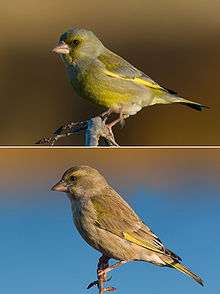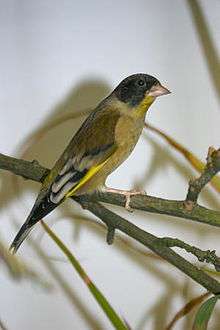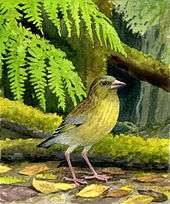Greenfinch
The greenfinches are small passerine birds in the genus Chloris in the subfamily Carduelinae within the Fringillidae. The species have a Eurasian distribution except for the European greenfinch, which also occurs in North Africa.
| Greenfinch | |
|---|---|
 | |
| European greenfinch (Chloris chloris) Male above, female below | |
| Scientific classification | |
| Kingdom: | Animalia |
| Phylum: | Chordata |
| Class: | Aves |
| Order: | Passeriformes |
| Family: | Fringillidae |
| Subfamily: | Carduelinae |
| Genus: | Chloris Cuvier, 1800 |
| Species | |
|
See text | |
| Synonyms | |
|
Chloris Cuvier, 1800 (but see text) | |
These finches all have large conical bills and yellow patches on the wing feathers.
The greenfiches were formerly placed in the genus Carduelis. Molecular phylogenetic studies showed that the greenfinches form a monophyletic group that is not closely related to the species in Carduelis and instead is sister to a clade containing the desert finch (Rhodospiza obsoleta) and the Socotra golden-winged grosbeak (Rhynchostruthus socotranus).[1] The greenfinches were therefore moved to the resurrected genus Chloris which had originally been introduced by the French naturalist Georges Cuvier in 1800 with the European greenfinch as the type species.[2][3] The name is from Ancient Greek khloris, the European greenfinch, from khloros, "green".[4]
Extant species
The genus contains five species:[3]
| Image | Scientific name | Common name | Distribution |
|---|---|---|---|
 | Chloris ambigua | Black-headed greenfinch | Yunnan, northern Laos, eastern Myanmar and adjacent areas of Vietnam, Thailand and northeastern India |
.jpg) | Chloris chloris | European greenfinch | Europe, North Africa and Southwest Asia |
| Chloris sinica | Grey-capped greenfinch | East Asia | |
| Chloris monguilloti | Vietnamese greenfinch | Vietnam | |
 | Chloris spinoides | Yellow-breasted greenfinch | northern regions of the Indian subcontinent |
Fossil species

- Trias greenfinch, Chloris triasi - Holocene of La Palma, the Canary Islands, Spain
- Slender-billed greenfinch, Chloris aurelioi - Holocene of Tenerife, the Canary Islands, Spain
References
| Wikimedia Commons has media related to Chloris (Fringillidae). |
- Zuccon, Dario; Prŷs-Jones, Robert; Rasmussen, Pamela C.; Ericson, Per G.P. (2012). "The phylogenetic relationships and generic limits of finches (Fringillidae)" (PDF). Molecular Phylogenetics and Evolution. 62 (2): 581–596. doi:10.1016/j.ympev.2011.10.002. PMID 22023825.
- Cuvier, Georges (1800). Leçons d'anatomie comparée. Volume 1. Paris: Baudouin. Table 2. The year on the title page is An VIII.
- Gill, Frank; Donsker, David (eds.). "Finches, euphonias". World Bird List Version 5.2. International Ornithologists' Union. Retrieved 5 June 2015.
- Jobling, James A. (2010). The Helm Dictionary of Scientific Bird Names. London: Christopher Helm. p. 102. ISBN 978-1-4081-2501-4.